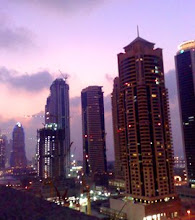| How can a manufacturer of soap powder, shampoo and skin creams be an agent for change in the Middle East's media industry? The answer, of course, is advertising spend. With newspapers, magazines, radio and (most) TV being distributed for free, media owners rely on advertising to generate revenue. Knowing this, the advertisers have the right to expect certain demands to be met. | |
| Understandably, such a situation is not popular among advertisers. It wastes their money and makes them complicit in potentially fraudulent transaction. The biggest advertisers in the Middle East have been working for years to change this. |
Monday, March 31, 2008
Flabby media dodges another bullet
Arab business doesn't need driven women...it needs them to drive themselves
| There has been plenty of jaw-jaw on how to get more Arab women into the work place, now there is chance hard cash will be thrown at the issue. The women's advisory panel of the Islamic Development Bank is meeting in Bahrain to discuss ways of spending a $10bn poverty-reduction fund. | |
In Saudi Arabia, where 58 per cent of University students are women, only around 9 percent of the women of the working age are available to work. As Arab News reports today, maybe the best to get women contributing to the economy is allowing them to drive. $10bn will buy a lot of Nissan Sunnys. |
Wednesday, March 26, 2008
An oversupply of F1 tracks
Bernie Ecclestone, boss of Formula 1, must love coming to the
Thursday, March 13, 2008
A crash felt around the world
Wednesday, March 12, 2008
UAE govt acts to stop locals emigrating
The UAE is considering a plan to provide citizens of the Gulf state with discounts on 14 food items, gasoline and cooking fuel to help offset inflation, the head of a consumer protection body said. Under the proposal, the ministry of social affairs will provide nationals with cards they can use at 16 co-operative supermarkets in the country to be eligible for the discounts.
A masterstroke. The UAE economy, up 7.4 per cent last year, would no doubt collapse without the hard work and innovation of UAE nationals, who make up around 10 per cent of the country’s working population. Any initiative that keeps talent in the UAE, and discourages locals from emigrating to, say,
Tuesday, March 11, 2008
Ugly fight for slice of the beautiful game
It’s hard to make sense of Dubai International Capital’s lengthy wrestle for control of Liverpool Football Club. The latest reports – and things seem to change on a daily, if not hourly basis – is that Tom Hicks, the club’s co-owner, has terminated all talks with DIC. Last week it looked as though DIC would settle for a 49 per cent share, leaving majority control with Hicks. Hicks was then angered after reading DIC only agreed to 49 per cent as a means to an eventual takeover.
Monday, March 10, 2008
YouTube as crap media-buster
Newspapers that write feel-good pap, TV stations that don’t touch domestic stories, radio stations that read the news off the BBC. It would be easy to live a year in the Middle East and barely know what was happening on your doorstep.
Much is made of the lack of press freedom in the region, but maybe it is more to do with the lack of journalistic creativity. Perhaps it’s best to leave news reporting to the amateurs?
Wajiha Huwaidar, a Saudi activist, marked this year's International Women's Day by defying a ban on women driving in the ultra-conservative kingdom and posted a video of her act on YouTube. The video doesn’t show much, just Wajiha pootling around some quiet country roads and talking to camera. It doesn’t need
Thursday, March 6, 2008
Lessons from Watergate for currency speculators
 Will they, won’t they? It seems the world and his wife has an opinion on the dropping dollar and whether Gulf currencies will depeg or devalue. If you don’t like today’s verdict, wait half an hour and there will be anew one along.
Will they, won’t they? It seems the world and his wife has an opinion on the dropping dollar and whether Gulf currencies will depeg or devalue. If you don’t like today’s verdict, wait half an hour and there will be anew one along.Emirates Business today reports that Middle East banks are reducing their exposure to the US dollar ahead of an anticipated US rate cut later this month. “You will see an increase in investments in commodities and long-term bonds,” says R Seetharaman, Chief Executive of Qatar’s Doha Bank.
If you want to know what will happen with the dirham, maybe the best advice is to act like Bernstein and Woodward, the Washington Post reporters who brought down President Nixon: “Follow the money.”
Wednesday, March 5, 2008
Competing financial markets are good for business
UAE needs free media, not big media
Monday, March 3, 2008
Why should low-cost carriers have all the Sales fun?
Low-cost carriers have been around for years, and if there’s one sure-fire way for them to drum up a little publicity, to remind travelers they really do offer low-low fares, it’s the ‘all seats for sale from one dollar/pound/euro/dirham’ offer. It works as well in Luton as it does in
Sunday, March 2, 2008
Labor camps: a tool of segregation
 Giddy excitement in
Giddy excitement in While better facilities are a step in the right direction, it is worth remembering such camps entrench the view that laborers are a resource that is to be used, controlled and, when finished with, shipped out. A fresh batch can then fill the accommodation.
Such camps, however well equipped, cement the view that laborers are not expats – they have no place in mainstream society, they can’t be expected to live among the community, they can’t rent accommodation on the open market. This camp ensures the two need never mix, and is that really the sign of a healthy and confident society?

